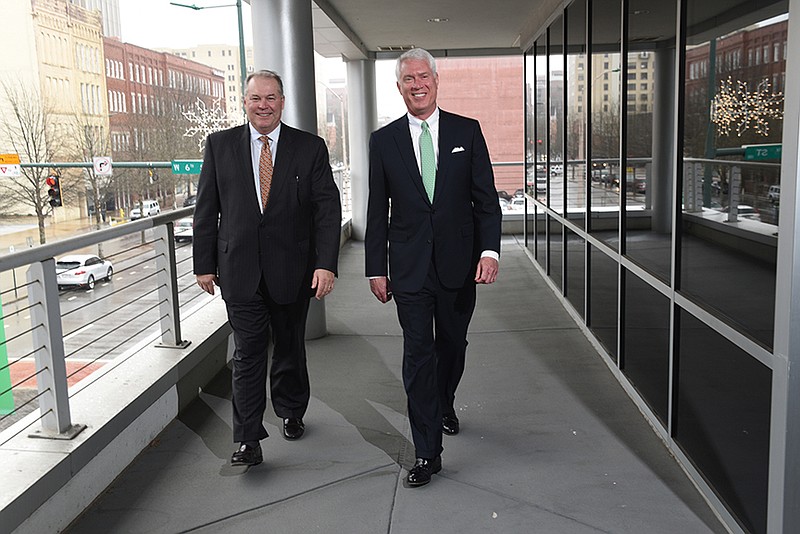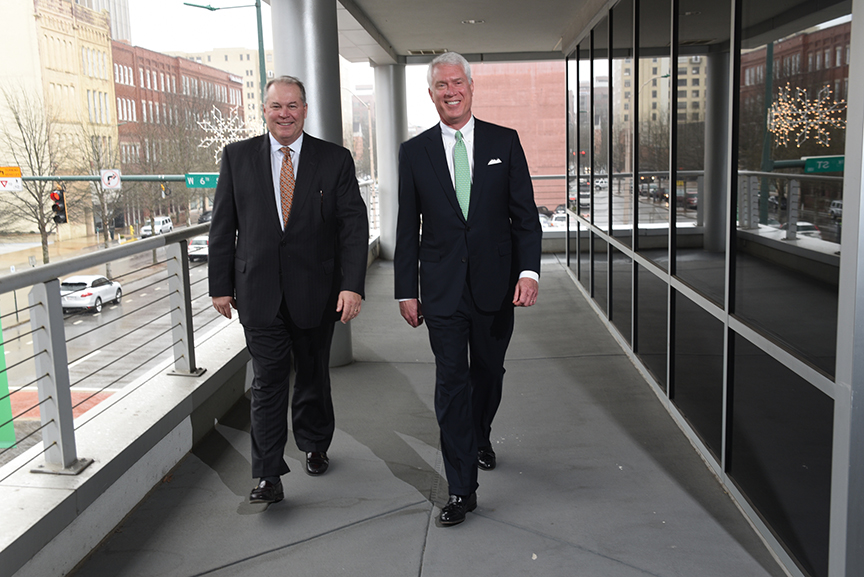Company at a glance
› Parent company: Atlantic Capital Bancshares› Banks: Atlantic Capital in Atlanta and FSG in Chattanooga› Stock symbol: “ACBI” on the Nasdaq Exchange› Assets: $2.6 billion› Market value: About $320 millionOffices: 26 branches, seven of which are being sold› Staff: 358 employees› CEO: Doug Williams› President: Mike KramerSource: Atlantic Capital BancsharesChattanooga bank mergers› CapitalMark, formed in 2007, was acquired by the Nashville-based Pinnacle Bank for more than $200 million in stock and cash.› FSG, formed in 2000, was acquired by the Atlanta-based Atlantic Capital Bancshares Inc., for $160 million in stock and cash.› Cornerstone, started in 1985, merged with the Knoxville-based SmartBank in a stock deal.› Northwest Georgia Bank, founded in 1904, was acquired by the Nashville-based FirstBank for an undisclosed amount.
Last year, four of Chattanooga's biggest community banks merged with bigger and more profitable regional banks based elsewhere in Tennessee and Georgia.
As the combined banks merge their operating systems this year, most are taking on the names of their new owners this spring. Cornerstone Bank branches converted to SmartBank offices last week. CapitalMark is scheduled to convert to the Pinnacle Bank name later this month and Northwest Georgia Bank plans to put up the FirstBank name in May.
FSG Bank, Chattanooga's biggest independent bank which combined with Atlantic Capital Bank in Atlanta last November, is the only one of the four Chattanooga banks merging with another bank that is not taking on a new name - at least for now.
But while the FSG name may remain for a while, the focus and market emphasis of FSG is clearly changing.
Rather than continue its vast branch network and serve so many small communities in the region, FSG is now targeting small to mid-size businesses in a more focused strategy with only about half as many bank branches as what FSG once had. As a result, FSG, which had already sold or shuttered a dozen branches over the past four years, is selling another seven bank branches this spring to other banks.
"One of the traps is trying to be all things for all people," said Mike Kramer, the former CEO of FSG who is now president of the combined Atlantic Capital Bancshares. "We've tried to narrow our focus to concentrate on offering the very best services and products for small to mid-sized businesses, their managers and the employees. It's a strategy we've had success with and we found that Atlantic Capital has done even better doing than us."
As a result, FSG has agreed to sell its bank branches in Cookeville, Algood and Gainesboro, Tenn., which collectively have $116 million in deposits and $31 million in loans, to First Freedom Bank. Other FSG branches in Athens, Lenoir City, Madisonville and Sweetwater, Tenn., which collectively have $104 million in customer deposits and $15 million in loans and other assets, are being sold to Athens Federal Community Bank. Pending regulatory approval, the branch sales should be complete in the second quarter of 2016.
Kramer, a veteran banker who previously worked on turning around operations at two other banks, was hired by FSG five years ago to help turn the Chattanooga bank around after hefty losses in the recession. Kramer said electronic communications is changing where and how people bank.
"The branches are now in your phone," Kramer said. "We've looked at bank branches shrinking since I got here to not only fit the business model, but also to better reflect the reality of how people want to do their banking. Even in branches where we are gaining in market share, transaction volume is not growing at the same pace."
Doug Williams, a former Wachovia Banker who helped start Atlantic Capital Bank in 2007 to focus on small and mid-sized businesses, said FSG shares a similar banking philosophy to Atlantic Capital. In less than a decade, Atlantic Capital has grown to more than $1.5 billion in assets from a single office in Atlanta by utilizing electronic and personal calling services by its expert staff.
"With very good electronic services, the need for physical presence is diminished," Williams said. "The future of banking is not in bricks and mortar; it's in electronic delivery."
Williams is heading the combined bank but Kramer is president and a new chief financial officer, Patrick T. Oakes, was hired late last year.
"This is truly a merger, not just the sale of the legacy FSG bank," Kramer said.
Williams said he is excited about the opportunities presented with FSG, which is bringing its mortgage lending and wealth management operations to Atlanta.
"We think as we combine these companies, we can be a superior performer over time," Williams said. "We have an objective to double the size of the business over a five-year time horizon."
The growth will come from both within the current bank and from other bank acquisitions, Williams said. John Coffin, formerly the director of corporate banking for the Atlanta market at Atlantic Capital, has been named to a new job to examine and evaluate market expansion opportunities.
Williams insists that having a focused strategy is vital for the bank's success.
"Everything we're doing, including mortgage lending, retail banking, our trust and wealth banking business, it's all focused on supporting this focus on small- to mid-sized companies, their owners, their managers and their employees," he said. "We intend to be very disciplined in pursuing our mission."
Williams said "there may be some opportunities" for other branch consolidation later this year. While employees attached to the branches being sold will move to their new owners, bank officials say they are not looking to trim the overall staff.
"While there is some savings from the branch reductions, we are reinvesting those savings and our budget is actually for 12 new bank positions," Kramer said. "This is much less about pure cost savings, but it is about refocusing the business model."
That model is far different today than when a group of former Pioneer Bank executives helped organize First Security Group and opened what was then Frontier Bank in 1999. Under the leadership of former Pioneer Bank President Rodger Holley, FSG acquired other banks in Northwest Georgia and in East and Middle Tennessee to ultimately build a bank with 37 branches and nearly $1 billion in assets. FSG offered a range of bank services across its vast retail network.
As the economy and technology shifted, however, FSG's vast branch network proved costly. When construction and development loans were slammed by the recession, FSG suffered more than $140 million in losses from 2009 until the bank was recapitalized and returned to profitability in 2014.
Williams said Atlantic Capital acquired FSG for several reasons. The Chattanooga and Knoxville markets where FSG operates are growing and are well suited for the business-focused strategy of the bank, Williams said. Buying FSG, which was already publicly traded, also was an efficient route to the public capital market to convert Atlantic Capital into a stock-traded company to give its owners more liquidity. And thirdly, the purchase diversified Atlantic Capital's deposit base by giving the bank more retail presence and a more diversified deposit base.
"I also wanted Mike Kramer on my team," Williams said. "He and the leadership at FSG did a terrific job in East Tennessee, and we're looking forward to see what they can help us do in Atlanta."
Kramer first came to FSG in 2010 when he was a managing partner for a Louisville equity fund specializing in investing in banks needing capital. At Ridley Capital Group, Kramer focused on banks from $1 billion to $3 billion in assets who were struggling after the 2008 banking downturn.
FSG, like a handful of other banks in the region, was operating at the time under a consent degree until it turned its finances around. Kramer proposed a plan for Ridley to invest in FSG, provided there was new management in place. The FSG bank turned down Kramer's offer, but came back the next year and offered Kramer the job as CEO of FSG.
Kramer accepted and spent the next four years upgrading operations, raising outside capital and cutting loan losses to ultimately arrange a merger with a comparably sized but better capitalized bank in Atlanta, Atlantic Capital.
Kramer has now completed three bank turnarounds in the past decade and a half, but he says he has no interest in any others.
"I like what I'm doing and where I am," he said.
Contact Dave Flessner at dflessner@timesfree press.com or at 423-757-6340.

